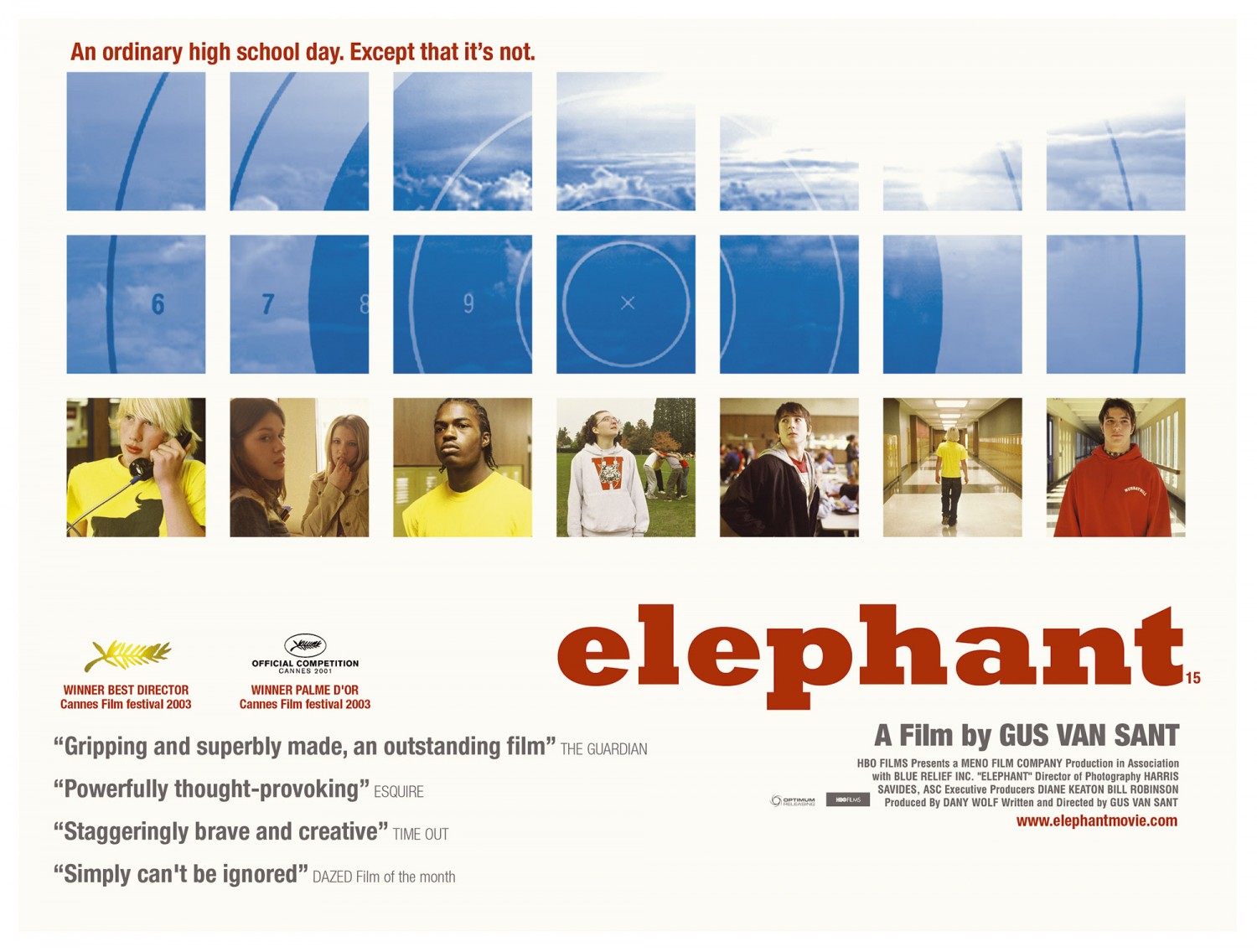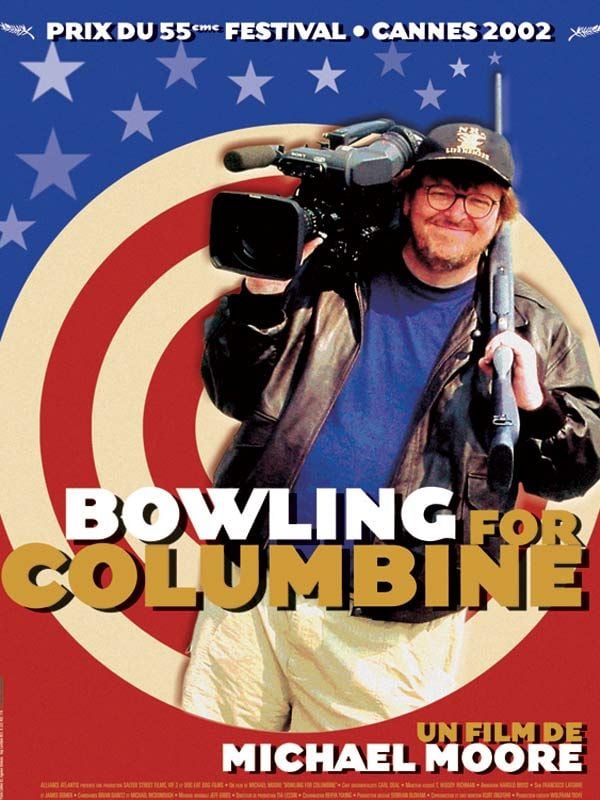1) What struck you most in the film?
I personally found the visual composition of this film brilliant. I like the way Gus Van Sant develops a minimalistic style throughout the film, because the idea of showing the moments that preceded a massacre in such a simple and neat way (instead of the chaos I thought I would find before I started watching this movie) is, in my opinion, innovative and bright. It struck me (I don't know how to say it in any other way) the lack of elements. I was struck by the predominence of silence, of calm, of easiness all along the movie. We are really thrown into the very intimacy of each character. It's just another day. Nothing leads us to think something awful is really about to happen.
2) What also impressed you?
I'm impressed by the elasticity time acquires in this movie. Since it constantly introduces and follows new characters, you genuinely can't tell if the whole plot is taking place within the same day. That creates an overall impression of peace and routine, and it took me a long time to truly understand that the whole film was a recapitulation of the events that took place right before the massacre happened, from different perspectives (we even have that corridor scene that was filmed three times, each one of them from a different perspective (John's, Michelle's and Elia's).
3) Did you find anything more particularly upsetting?
There are a few things in this movie I indeed found particularly upsetting. The most important one might be the way teens are portrayed. I believe the way Gus Van Sant perceives teenagers (and therefore the way he transmits it trough this film) is strongly limited by societal stereotypes on what a youngster must look/think/act like. Since this movie allows us viewers to immerse into the daily routine of those who were brutally murdered, we often have access to their conversations. Whilst listening to them, I found it unbelievable how teenagers on this movie are shown as individuals with a striking lack of intellectual abilities. They only seem to talk about, well, "concert tickets", "who is dating who"...we find any possible stereotype of teen issues (some girl might as well be pregnant, a few other girls have an eating disorder because they want to look thin and pretty) but none of that is realistic. Just because the characters are arranged into very specifically categories (jocks, geeks and artsy) that doesn't make them any more stuck-to-reality and it doesn't helps us viewers to empathize with them: we don't feel close to them because, in our minds, they are not fully alive. Instead, they are walking cliches pretending to embody a whole generation.
4)What did you find very disturbing?
I am aware of the fact that this is a small detail that probably didn't shock anyone else among those who were viewing the film in class, but we don't see any type of evolution in the killers' behaviors.I mean, we know how they bought their supply of weapons, how they were deeply unhappy during their daily routine but we can't truly understand how they went from "misunderstood teenagers" to "mass killers". By just watching the film, we can't know what crossed their minds when they decided to put an end to so many lives. We can't know what happened to their twisted thoughts that made that difference, we don't understand them. Perhaps that's just what Gus Van Sant wanted to transmit; that it doesn't matter how much you observe an individual, how much time you spend with them, you can't know what's crossing their minds. There wasn't a turning point in Alex and Eric's behavior when they decided they were going to commit those crimes, simply because even if there would have been a visible difference in their attitude, nobody would have noticed. That's why, when watching the film, we feel like the shooters were born with the only purpose of accomplishing those murders. Maybe Gus Van Sant didn't give a clear answer to the question "why" because he couldn't figure out a satisfactory explanation for those crimes. He's just as passive as we are. The filmmaker just tries to narrate a tragedy, instead of justifying it.
I also believe the title itself illustrates this idea. "Elephant" refers to the english expression "elephant in a room", used to describe a situation in which there is a huge problem that might eventually become dangerous but that everyone decides to leave aside, to ignore.
5) What did you find most shocking?
We barely even focus on the two killers! That's pretty impressive I think. The director's choice was to portray the tragedy's circumstances in such a way that Alex and Eric are not even the main characters; because Elephant is not even their story. Is the story of everyone whose life was taken. It took me a long time to realize this; that the two most important people in this tragedy are shown as a disturbance in the storyline, since they are going to put an end to the stories (to the lives) of those who we have followed and whose intimacy we have shared since the very beginning of the film; those whose names were written in a white font with a black background every now and then in the middle of the screen. To sum it up, this is not a story about two murderers, but the story about those who were murdered.
6)What does the film suggests about the two school shooters?
We can witness several times how the two school shooters were being harassed by their schoolmates so, to some extent, the film suggests that the massacre that followed could have come as a consequence of the students' aggressive behavior towards the soon-to-become killers. It is also suggested (in a very subtle way, without any connotation) that the two murderers could have been going through some kind of sexual identity crisis. Nevertheless, that detail is shown as quite irrelevant and does not contribute whatsoever to the plot's development.
7) What's more, what does the film director make clear about the two killers?
This is something I find particularly interesting and that, I think, makes this film a lot more realistic: the filmmaker insists a lot on the fact that these two teenagers were not monsters. One of them is even portrayed as a quite talented young man (he has musical skills) whilst the other one is simply a slacker. Anyways, they are not creatures made of pure evil. If we study carefully their behavior we can see in fact that they are never shown as anything but confused, self-loathing teenagers who seem to have lost control over their own lives and minds and want to take revenge over everyone surrounding them.
8) What kind of approach to the school shooting itself did Gus Van Sant Opt for?
Every time I watch the scene depicting the school shooting itself, I feel like it doesn't belong to reality. As if the characters were living some kind of gloomy fantasy. At the very beginning, before the perpetrators actually started shooting people down, everything happens in slow-motion that makes the viewer feel somewhat untied from reality. We don't realize how dangerous this whole situation really is until one of the killers fires at Michelle. Then everything happens really quickly.
Once the massacre has truly begun, we follow each one of the characters the film has focused on. We witness how each one of them (excepted John) eventually find a horrible death. Through that method, Gus Van Sant wants us viewers to perceive the massacre as something personal: those are characters we know, we've taken a quick glance into their lives, and now they are dying right in front of us and there is nothing we can do to save them.
9) Moreover, what's the main consequence of the realistic treatment he uses? What about the "poetic" touches he instills throughout the film?
The main consequence is that the tragedy becomes a lot more striking and disturbing for the viewer. All along the film we feel everything is so quiet and peaceful...The symmetry and odd beauty of every frame immerses us in a world of stillness and ease. We are living the quiet routine of those teenagers, born and raised in a small town where nothing disturbing ever happens. Everything seems to move in a very poetic and harmonious way, that's why the film feels a bit slow every now and then. Gus Van Sant wants to make beauty out of reality. That's why, when the shooting finally takes place, it becomes something so violent for the viewer that it's almost unbearable. Every trace of poise and serenity is brutally destroyed as the two murderers execute their carnage. It's like Gus Van Sant wanted to create something perfect and beautiful only to destroy it at the ending of the film. The message he conveys to the audience is that there might be something poetic in our everyday life, but there isn't in such thing as a tragedy. He cannot make it look beautiful and balanced. Because it wasn't.
10) As a conclusion, what must we admit about the way in which the killing and the killers are perceived by the film viewers?
Throughout the movie there is such an intimacy between the characters and the viewer that it feels like we are blending into their universe. We are even able to follow them physically during their long walks in the high school corridors. The lack of action we witness all along the film impregnates us viewers with a deep feeling of stillness and composure. Plus the fact that the events that preceded the massacre are shown in such an aesthetic and poetic way makes it hard for us to believe that the film is going to conclude with something as brutal as a carnage; even once we're familiarized with the two killers and the plans they have made. Killers themselves are also portrayed in a very human way: we can see them performing random acts (playing piano, playing video games, having breakfast...) so it's hard for us to perceive them as inhuman creatures; as monsters. When the killing happens, it puts an end to every trace of calm and easiness in the movie. There are some moments of the killing scene itself that might be considered poetic due to the slow motion or the music in the background (e.g: the scene that introduces Benny and follows him through the school corridors until he gets unexpectedly murdered). Nevertheless, the killing scene is an abrupt return to reality after what seemed a whole movie taking place in a universe of peace and routine.








